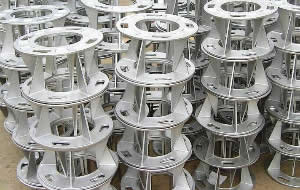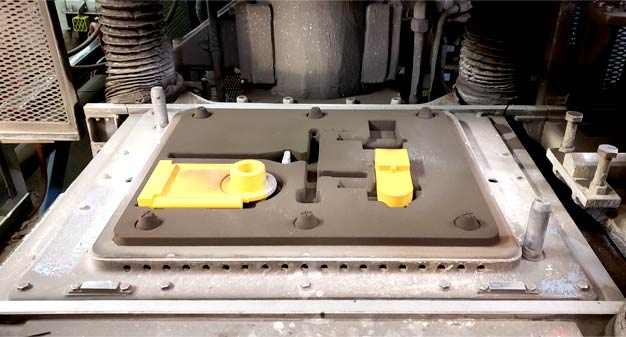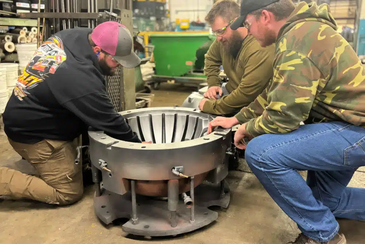Discover the breakthroughs in Precision aluminum casting for modern industries
Exactly How Factory Solutions Enhance Production Effectiveness and Quality in Industrial Applications
Foundry solutions play a vital role in boosting production effectiveness and quality across numerous commercial applications. By applying sophisticated metal spreading techniques, these services assure parts are made with precision and uniformity. This not only lowers lead times but also decreases waste, cultivating much better cooperation between shops and makers. The influence of top quality parts on functional performance raises vital inquiries about the future of commercial manufacturing. What technologies lie ahead in this advancing landscape?
The Function of Foundry Solutions in Streamlining Manufacturing Processes

Foundries frequently offer competence in alloy advancement, making it possible for makers to make use of innovative materials that boost product performance. The partnership between makers and shops cultivates a far better understanding of manufacturing needs, bring about enhanced processes and boosted item styles. By leveraging factory services, makers can accomplish greater adaptability, adapt to altering market demands, and maintain competition in the market. On the whole, the function of factory services is essential in facilitating a more effective and economical production landscape.
Advanced Technologies in Shop Procedures
Ingenious modern technologies are changing factory operations, noticeably enhancing efficiency and accuracy. Automation plays a necessary role, with robotic systems simplifying repeated tasks such as molding and product handling. Additionally, innovations in computer-aided style (CAD) and computer-aided manufacturing (CAMERA) systems make it possible for shops to create intricate geometries with greater precision and lowered product waste.
Moreover, the combination of expert system (AI) and artificial intelligence improves top quality control by checking procedures in real-time and anticipating potential issues before they occur. Using sophisticated products, such as light-weight alloys and compounds, further improves the performance characteristics of actors products.
3D printing modern technology is revolutionizing prototyping and tooling, enabling for rapid customization and reduced lead times. Jointly, these sophisticated modern technologies not only elevate manufacturing effectiveness yet also ensure that the final items satisfy rigid top quality requirements, placing shops at the leading edge of modern-day commercial applications.
Minimizing Lead Times With Reliable Foundry Practices
Efficient foundry methods play a crucial role in reducing lead times within production settings. By applying streamlined manufacturing processes and advanced organizing techniques, suppliers can improve workflow and optimize resource allotment. These improvements not just increase output however likewise add to total functional efficiency.
Streamlined Production Procedures
Streamlining manufacturing processes is vital for reducing preparations in the manufacturing industry. Effective shop methods, consisting of enhanced process and source monitoring, play a critical duty in accomplishing this goal. By minimizing waste and improving interaction amongst groups, foundries can substantially boost their operational efficiency. The execution of standardized treatments also adds to consistent high quality and faster turnaround times, allowing suppliers to respond more quickly to market demands. Additionally, the combination of innovative innovations, such as automation and real-time monitoring systems, assists in identifying bottlenecks and helping with prompt interventions. Overall, a concentrate on streamlined manufacturing procedures not only speeds up lead times yet likewise boosts the overall competition of industrial applications, making sure that items meet consumer expectations successfully.
Advanced Organizing Techniques
Reliable production processes naturally lead makers to explore advanced scheduling methods as a way to further minimize lead times. By employing advanced formulas and software application, shops can optimize workflows, lining up manufacturing routines with demand projections and source accessibility. Strategies such as Just-In-Time (JIT) organizing minimize stock expenses while making certain timely product distribution, thus boosting operational performance. Additionally, incorporating real-time information analytics permits factories to expect possible hold-ups and readjust timetables proactively. This flexibility not only simplifies procedures yet likewise enhances overall productivity. In addition, collaborative planning with consumers and vendors can promote a much more integrated supply chain, more reducing lead times. Inevitably, these advanced scheduling techniques equip foundries to attain higher performance and remarkable quality in their manufacturing procedures.
Making Certain Precision and Quality in Metal Casting
Guaranteeing accuracy and top quality in steel casting requires a precise method that includes every stage of the production procedure. This procedure starts with careful style and design of the mold and mildews, ensuring they can withstand the molten steel's temperature and stress. The choice of high-grade resources is important, as impurities can jeopardize the final item.
Once the products are prepared, specific temperature level control during melting and putting is fundamental to attain the desired homes in the cast metal. Keeping track of solidification and cooling rates additional guarantees dimensional accuracy and surface area finish.
Quality control methods, such as non-destructive screening and examination, are critical to determining issues early in the process. Precision aluminum casting. Additionally, utilizing experienced employees that comprehend the nuances of steel casting contributes considerably to keeping high standards. In general, these techniques collectively boost the dependability and efficiency of actors components in different commercial applications
Reducing Waste and Maximizing Source Usage

In addition, reusing scrap metal within the factory itself can significantly decrease waste, transforming byproducts into functional resources. Lean manufacturing concepts also add to waste decrease by enhancing processes and removing unneeded steps, leading to extra reliable procedures.
Normal maintenance of equipment guarantees peak efficiency, avoiding breakdowns that can result in thrown away products. By concentrating on these methods, shops not only reduce expenses however likewise add to lasting practices, lining up with the growing need for eco accountable production techniques in industrial applications.
The Competitive Benefit of High-Quality Components in the Market
High-grade elements offer a considerable affordable advantage in the factory market, where precision and toughness are critical. Makers that prioritize premium materials and workmanship can boost product performance and dependability, resulting in boosted customer satisfaction. This advantage is especially noticeable in industries such as automobile and aerospace, where part failing can have devastating repercussions.
Furthermore, high-quality parts typically lead to lower upkeep expenses and prolonged item lifespans, which can be attractive selling factors for possible customers. As market needs expand for lasting and reliable modern technologies, the focus on top quality becomes much more essential. Firms that spend in premium shop solutions not only enhance their production procedures but also separate themselves from rivals who may sacrifice quality for cost savings. The commitment to top quality parts inevitably equates right into a more powerful market setting and lasting service success.
Frequently Asked Inquiries
What Types of Materials Do Foundry Solutions Generally Function With?
Shop solutions typically deal with metals such as light weight aluminum, steel, iron, and brass, along with numerous alloys. They likewise handle materials like ceramics and composites, dealing with diverse commercial requirements and specifications in making procedures.
Just How Do Foundry Provider Impact Overall Supply Chain Management?
Shop services substantially enhance supply chain monitoring by improving product sourcing, decreasing preparations, and ensuring constant quality. Their capacity to offer customized solutions fosters collaboration among stakeholders, inevitably enhancing overall functional efficiency and responsiveness in manufacturing.
What Industries Advantage A Lot Of From Foundry Solutions?
Industries such as auto, building, consumer, and aerospace goods substantially gain from factory solutions. These sectors rely upon accuracy spreadings to meet stringent top quality requirements and improve their general production procedures and product performance.
Are Factory Solutions Lasting and Environmentally Pleasant?
Shop services can be lasting and ecologically pleasant, particularly when employing innovative modern technologies and processes - aluminum casting. Advancements such as recycling materials, decreasing exhausts, and maximizing power usage add to reducing their ecological effect in commercial applications

Exactly How Can Firms Choose the Right Factory Solution Provider?
Companies can choose the appropriate factory service provider by reviewing expertise, manufacturing capabilities, top quality accreditations, technology made use of, client reviews, and sustainability techniques while making certain alignment with their specific project demands and lasting organization goals.
Shop services play a crucial role in boosting production performance and quality throughout various commercial applications. The collaboration in between producers and shops fosters a far better understanding of production requirements, leading to optimized processes and enhanced product styles. Efficient foundry methods play an essential duty in lessening lead times within manufacturing settings. By employing advanced formulas and software, factories can enhance operations, lining up manufacturing schedules with demand projections and source availability. Firms that invest in high-quality factory services not only enhance their manufacturing procedures but likewise separate themselves from rivals that might sacrifice high quality for price financial savings.